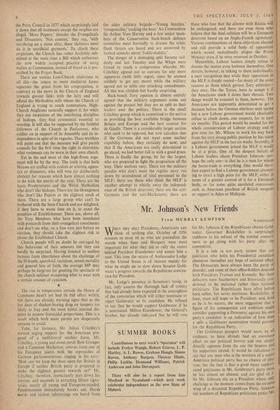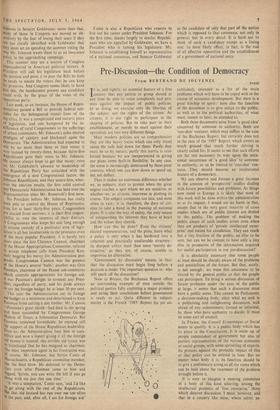Mr. Johnson's New Friends
From MURRAY KEMPTON
WASHING" ON
WHEN they elect Presidents, Americans can think of nothing else. October of 1956 remains to most of us who are journalists the month when Suez and Hungary were most important for what they did to rally the voters behind President Eisenhower and assure him a rout. This time the return of Ambassador Lodge to the United States is of interest mainly for what he might do to slow down Senator Gold- water's progress towards the Republican nomina- tion for President.
Mr. Lodge's presence in Scranton's troop, in fact, only assures the thorough lack of comity that had already been expected in the atmosphere of the convention which will either nominate or reject Goldwater as its candidate. He refused to say that he would support Goldwater if he is nominated. Milton Eisenhower, the General's brother, has already indicated that he will vote
for Mr. Johnson if the Republicans choose Gold- water. Governor Rockefeller is surprisinglY stubborn in his refusal of the normal commit- ment to go along with his party after the convention.
It is a rule in our party system that anY politician who bolts his Presidential candidate abandons thereafter any hope of national office. The Democrats have always been the party Of disorder, and some of their office-holders deserted both Presidents Truman and Kennedy. But these defectors were Southerners and historically con- demned to be sectional rather than national politicians. The Republicans have often before been sullen, but never mutinous. Rockefeller. at least, must still hope to be President; and, bold as he is by nature, the mere suggestion that a figure of his consequence and ambition might consider 4upporting a Democrat against his owl party's candidate is an indication of how deep a split a Goldwater nomination would portend for the Republican Party. The Goldwater prospect would seem, by all evidence, to have already had an enormous effect on our political history and one almost directly opposite from the one the Senator and his supporters intend. It would be ridiculous t° say that any man who is the nominee of a major American political party has no chance of elec- tion; but the fact is that a good many sophisti' cated politicians in Mr. Goldwater's party thin he has almost no chance, and are glad of it So Mr. Johnson sits as a President whose onlY challenge at the moment comes from the extreme wing of a disunited Republican Party. Substan- tial numbers of Republican politicians prefer Mr.
Johnson to Senator Goldwater; more than that, many of those in Congress are moved so ob- sessively by the fear of losing their seats if they are too closely identified with Goldwater that they seem set on spending the summer voting the way Mr. Johnson wants them to as an insurance Policy in the approaching campaign.
This summer may see a session of Congress unprecedented in American political history. A President will call his legislature back before the election and press it to pass the Bills he feels he needs to assure the voters that he can keep his promises. And Congress seems likely to hand him this, the handsomest present any candidate could wish, by the grace of the votes of the oPposition party. Last week, as an instance, the House of Repre- sentatives passed a Bill to provide federal sub- sidies for the beleaguered transit lines of the big cities, It was a complicated and esoteric piece of legislation, and one hampered by the in- difference of rural Congressmen to the sufferings of urban commuters. Mr. Johnson's aides exerted Prodigies of cajolery and blackmail upon the Democrats. The Administration had expected to win by no more than three or four votes; it won instead by twenty-three, because thirty-five Republicans gave their votes to Mr. Johnson. He cannot always hope to get that many; even SO, Mr. Goldwater's advance to leadership of the Republican Party has coincided with the emergence of a new Congressional factor, the Johnson Republicans, and they assure him, what- ever the election results, the first solid control any Democratic Administration has held over the Representatives since Mr. Roosevelt's first term.
No President before Mr. Johnson has really been able to control the House of Representa- tives for at least thirty-five years. Congressmen are elected from sections; it is their first respon- sibility to vote the interests of their districts. A Congressman who keeps his seat long enough to assume custody of a particular area of legis- lation is all but invulnerable to the pressures even of the most popular President; it is barely two years since the late Clarence Cannon, chairman of the House Appropriations committee, refused to accept telephone calls from President Ken- nedy begging his mercy for Administration pro- Posals. Congressman Cannon was the greatest of the House's several 'bulls'; another was Otto Passman, chairman of the House sub-committee Which controls appropriations for foreign aid; it was Passman's delight to torment any Presi- dent, regardless of party, and his pride always to cut the foreign budget by at least 30 per cent.
This year the Administration cut its foreign aid budget to a minimum and determined to keep Passman from cutting it any further. Mr. Cannon ---Passman's great shield—had died in the spring and been succeeded by Congressman George Mahon of Texas, a Johnsonian Democrat. But Passman remained formidable; he enjoyed still support of the House Republican leadership. 'wen so, the Administration beat him in corn- Inittee and won a report giving it all the foreign aid money it wanted; this terrible old tyrant was s„? humiliated that he has resigned as chairman. 'he most important agent in his frustration was, °E course, Mr. Johnson; but Sylvio Conte of Massachusetts, a Republican committee member, Was the final blow. He defected to the Demo- ierats even after Passman came to him and °egged, `Sylvio, you can write the bill if you go along with me just this one time.'
It was a temptation,' Conte says, 'and I'd like „to go along with the rest of the Republicans. !Jut that old bastard has run over me too often In the past, and, after all, I am for foreign aid.'
Conte is also a Republican who expects to live out his career under President Johnson. For the first time, thanks largely to similar Republi- cans who are appalled by Goldwater, we have a President who is taming his legislature. Mr. Johnson is establishing himself 'as representative of a national consensus, and Senator Goldwater as the candidate of only that part of the nation which is opposed to that consensus, not only in general, but in every detail. It is hard not to think of such a candidacy except as a losing one; its most likely effect, in fact, is the end of all effective opposition and the establishment of a government of national unity.































 Previous page
Previous page